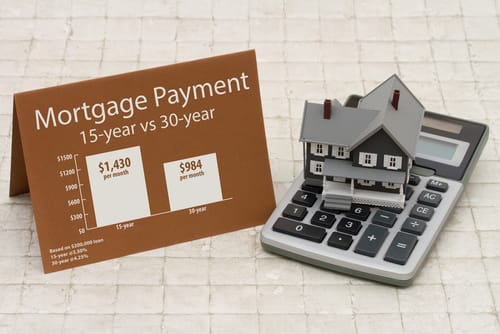
4 Things to Consider When Choosing a Mortgage Lender
Selecting the best lender for your mortgage is a critical part of preparing to buy a home. Here are four things to consider when choosing a mortgage lender.
Now that you’ve found the home you’re ready to buy, the next step is to determine if you’ll be taking out a mortgage to finance your new home. Once you’ve made this decision, and determined your current financial standing, you can begin your search for the right mortgage lender for you.
To choose the mortgage lender that best supports your home loan needs and financial standing, home buyers need to first understand what they should look for in a potential mortgage lender.
#1. Interest Rates Offered by the Mortgage Lender
As home buyers begin the process of home shopping, one thing to keep top-of-mind is making sure they secure the lowest interest rate they qualify for. Pursuing the lowest interest rate possible will help you save money throughout the duration of the loan.

Mortgage lenders take into account things like your credit history and credit score, annual gross income, recurring debts, and other factors unique to your situation. Interest rates vary by mortgage lender, which means in addition to shopping for homes, you’ll want to consider and compare lenders based on the interest rates they offer.
Having a comparison of interest rates offered by mortgage lenders of every size and scale is a good starting point to determine how much buying power they may help you gain, as well as how much money they can help you save in the long-run.
#2. The Loan Terms the Lender Offers
Still, it’s not enough to compare interest rates and jump into securing a mortgage loan with the first lender you find.
Once you’ve narrowed down your pool of potential lenders, you’ll want to take a closer look into the terms of their loans. Typically, mortgage lenders will offer 15, 20, and 30-year loans. Mortgage terms encompass the timeframe you have to pay off your mortgage loan.
The duration of the mortgage that is best for you is critical to take careful note of because it impacts:
- Payment towards your monthly principal
- The interest rate you’ll secure
- The amount of interest you will accrue and pay over the life of the loan
These factors ultimately shape your buying power, so determining which lender offers the terms you need for the home you’re purchasing is another important consideration when choosing the best lender for you.
#3. Types of Loans Provided By the Lender
Another key item to consider when choosing a mortgage lender — and when deciding to purchase a home — is the type of loan that’s right for you.

Aside from interest rates and durations, you need to consider the different types of loans that mortgage lenders may offer and which may be the best fit for your buying needs:
- Conventional mortgages: This mortgage type is the most common type of loan. This type includes fixed- and adjustable-rate loans and is usually provided by private lenders like banks.
- Government-insured mortgages: Government-backed mortgages have very specific criteria you must fulfill in order to qualify, and include FHA loans, USDA loans, and VA loans.
- Reverse loans: Also known as a reverse mortgage, reverse loans are offered to older homebuyers at least 62 years old. A reverse mortgage allows senior buyers to borrow part of their home’s equity to reduce monthly costs or supplement retirement income.
- Jumbo loans: This loan type is suited for buyers who need to take out a higher loan than the federal limit for a standard mortgage.
Your buying process is unique. Dig deeper into the loan type that’s best for your own scenario, and ensure the mortgage lenders you’re considering offer the one you’ve decided is the best fit for you.
#4. Down Payment Terms
Typically, you’ll want to have 20% of the home’s price for a down payment. Some mortgage lenders may even require you to have this 20% available in order to qualify for a mortgage from their institution.
If a 20% down payment isn’t feasible for your financial situation — which is common with home buyers — you’ll want to consider whether or not the mortgage lender you’re considering offers flexibility in their requirements for down payments.
These mortgage lenders will also likely require you to secure private mortgage insurance, or PMI, if you do not have a 20% down payment. PMI provides the mortgage lender with assurance and protection that you’ll pay the loan and not default.
Every home buying situation is unique, and great care and consideration must be taken when choosing a mortgage lender to finance your new home. A top agent can help walk you through what to look for in a lender. Get started in finding an agent on RealEstateAgents.com today!






